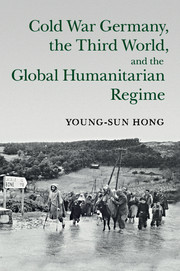Crossref Citations
This Book has been
cited by the following publications. This list is generated based on data provided by Crossref.
DONERT, CELIA
2016.
From Communist Internationalism to Human Rights: Gender, Violence and International Law in the Women's International Democratic Federation Mission to North Korea, 1951.
Contemporary European History,
Vol. 25,
Issue. 2,
p.
313.
Hannig, Florian
2016.
German Philanthropy in Transatlantic Perspective.
p.
205.
Christiaens, Kim
2017.
Europe at the crossroads of three worlds: alternative histories and connections of European solidarity with the Third World, 1950s–80s.
European Review of History: Revue européenne d'histoire,
Vol. 24,
Issue. 6,
p.
932.
Harrison, Mark
and
Yim, Sung Vin
2017.
War on Two Fronts: The Fight against Parasites in Korea and Vietnam.
Medical History,
Vol. 61,
Issue. 3,
p.
401.
Kim, Mina
and
Jung, Inha
2017.
The planning of microdistricts in post-war North Korea: space, power, and everyday life.
Planning Perspectives,
Vol. 32,
Issue. 2,
p.
199.
Solomon, Susan Gross
2017.
East European Public Health and the Cold War.
Revue d’études comparatives Est-Ouest,
Vol. N° 1,
Issue. 1,
p.
7.
DiMoia, John P.
2017.
Placing Image and Practice in Tension: South Korean Nurses, Medical Pedagogy, and the Indiana University Bloomington Nursing Program, 1958–1962.
East Asian Science, Technology and Society: An International Journal,
Vol. 11,
Issue. 4,
p.
499.
Gray, William Glenn
2018.
Foreign Relations: Where Germans Sell.
Central European History,
Vol. 51,
Issue. 1,
p.
102.
Vargha, Dóra
2018.
Polio Across the Iron Curtain.
Birn, Anne-Emanuelle
and
Krementsov, Nikolai
2018.
‘Socialising’ primary care? The Soviet Union, WHO and the 1978 Alma-Ata Conference.
BMJ Global Health,
Vol. 3,
Issue. Suppl 3,
p.
e000992.
BOTTA, FELIX A. JIMÉNEZ
2018.
The Foreign Policy of State Terrorism: West Germany, the Military Juntas in Chile and Argentina and the Latin American Refugee Crisis of the 1970s.
Contemporary European History,
Vol. 27,
Issue. 4,
p.
627.
List, Martin
and
Rolf, Jan Niklas
2018.
Kultur in den internationalen Beziehungen.
p.
85.
Duong, Natalia
2018.
Agent Orange Bodies: Việt, Đức, and Transnational Narratives of Repair.
Canadian Review of American Studies,
Vol. 48,
Issue. 3,
p.
387.
Schenck, Marcia C.
2019.
Negotiating the German Democratic Republic: Angolan student migration during the Cold War, 1976–90.
Africa,
Vol. 89,
Issue. S1,
p.
S144.
Birn, Anne-Emanuelle
and
Muntaner, Carles
2019.
Latin American social medicine across borders: South–South cooperation and the making of health solidarity.
Global Public Health,
Vol. 14,
Issue. 6-7,
p.
817.
Allen, Jennifer L.
2019.
Against the 1989–1990 Ending Myth.
Central European History,
Vol. 52,
Issue. 1,
p.
125.
Kloiber, Andrew
2019.
Food, Culture and Identity in Germany's Century of War.
p.
247.
Biess, Frank
and
Eckert, Astrid M.
2019.
Introduction: Why Do We Need New Narratives for the History of the Federal Republic?.
Central European History,
Vol. 52,
Issue. 1,
p.
1.
2019.
Europa und die Schlafkrankheit.
p.
329.
Pacino, Nicole L.
2020.
Peripheral Nerve.
p.
55.





